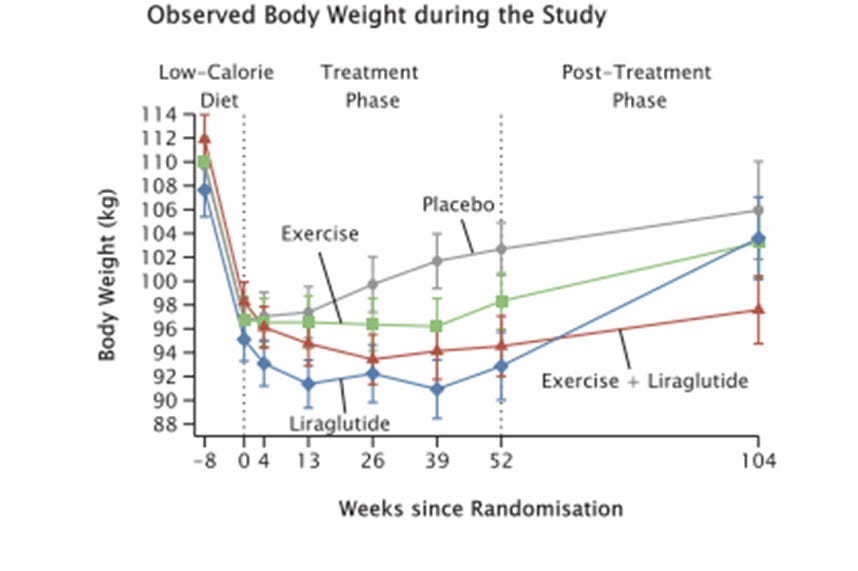Exercise program helps prevent some weight gain after stopping anti-obesity drugs
February 29, 2024
Source: Jensen, SB et al Lancet, February, 2024 LINK
The GLP-1 anti-obesity drugs such as Wegovy (semaglutide) and Zepbound (tirzepatide) are enormously effective at helping patients lose weight, but most people regain a substantial amount of that lost weight when they discontinue the drugs. Some vendors have been touting programs that include nutritional assistance and exercise guidance and suggesting that these can help people maintain weight after they discontinue these medications.
A small, randomized trial published in The Lancet suggests that those patients treated with a combination of exercise and liraglutide kept weight off better a year after conclusion of the trial compared to those treated with liraglutide alone. Both groups were taken off the medication in the second year of the study. Liraglutide is marketed in the United States as Saxenda, a daily injected GLP-1 medication which is associated with less weight loss than semaglutide and tirzepatide. The researchers excluded people with diabetes or other chronic diseases.
Participants in the trial first were given meal replacement with ultra-low-calorie diets for eight weeks, and those who lost 5% of their body weight (about 90% of those recruited) were randomized to four groups. Group 1 got placebo, Group 2 got placebo and an exercise program, Group 3 got liraglutide, and Group 4 got liraglutide and an exercise program. The exercise program included twice weekly in-person vigorous indoor cycling and circuit training and moderate to vigorous exercise at least two additional days a week. This study reviews the results of those who completed the study who were available for follow up for 12 months after the conclusion of the active study period.
None of the groups lost dramatically more weight after the initial 8 week near-fasting diet, and all four groups retained a substantial portion of their initial weight loss. The liraglutide plus exercise group retained the largest amount of weight loss a year after the conclusion of the intervention - retaining 6 kg more weight loss than the group on liraglutide alone. Researchers also found that the exercise program led to decreased fat mass and waist circumference.
This study has significant weaknesses. The study was small (fewer than 50 patients in each arm) and was performed in Denmark, which has a relatively non-diverse population. Only two-thirds of those in the study returned for the additional year of observation, and it’s likely those who regained more weight were lost to follow up. The study only included highly motivated individuals who had lost 5% of their body weight on a severe calorie restriction diet, and used a GLP-1 drug that is relatively less effective. The researchers did not comment on how many, if any, of the participants were placed on GLP-1 medications during the post-trial year of observation.
Nonetheless, this study suggests that supervised exercise programs might increase the amount of weight loss retained after cessation of GLP-1 medications.
Implications for employers:
This small study suggests that exercise can help people who have discontinued either GLP-1 medications or ultra-low-calorie diets maintain weight loss.
Exercise also decreased fat and waist circumference.
The exercise prescribed was vigorous and at least partially in-person, which might not be equivalent to virtual programs promoted by vendors in the US. Some with severe obesity might not be able to participate in such an exercise programs
If the results of this study are confirmed, exercise programs could be an important part of drug or dietary therapy for weight loss.
Many other studies have shown that exercise alone does not lead to significant weight loss.

